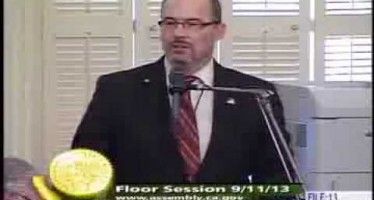High-Speed Rail Crashes Into Legislature
By KATY GRIMES
The costs and the legislation for the California High-Speed Rail Authority keep speeding toward a train wreck.
When the voters of California approved Proposition 1A in November 2008, they authorized $9.95 billion in general obligation bonds to fund a high-speed rail system in California. Most voters thought that the $9.95 billion was the total cost of the project. After all, it was $9,950,000,000.00. The state’s entire annual budget at the time was $84 billion.
But the high-speed rail plan has gone from a nifty idea to a monster agency, spending money California does not have under some questionable circumstances, and doing it with a complicit Legislature.
However, legislative support is changing. Even advocates of a high-speed train system appear to believe that the rail authority is operating in dubious ways.
There are 12 bills currently moving through the Legislature surrounding the California High-Speed Rail Authority. Seven of those bills were heard by the Assembly Transportation Committee on Monday. But only a few went on to other committees. The bills range in purpose from authorizing the creation of a new Department of High-Speed Rail state agency (AB 145 by Assemblywoman Cathleen Galgiani, D-Livingston), to requiring all rail contractors to hire only California employees (AB 16 by Assemblyman Henry Perea, D-Fresno).
There’s even a bill requiring Senate approval of all board appointees to the High-Speed Rail Authority (AB 1164 by Assemblyman Rich Gordon, D-El Camino Real).
The authority has operated without much oversight since it was created. The board members are appointed — five by the governor, four by the Legislature. But in recent years, the authority’s board has been tainted by poor accounting of expenses and ethics breaches including violating the state ban on holding incompatible offices, which has the “potential clash of two incompatible public offices held by a single official.”
Frustrated Legislators
Legislators appear to be growing increasingly frustrated with how loosely the authority’s board has been operating, which has led to the 12 proposed bills aimed at tightening up operations and more state control within the authority.
The California High-Speed Rail Authority has recently estimated that it will actually cost from $42.6 to $45 billion to complete the state’s high speed rail system, while outside estimates put the cost from $58 billion to $65 billion, including reports from the Howard Jarvis Taxpayers Association and Citizens Against Government Waste.
At issue currently is accurate ridership numbers. The ridership estimate provided by the authority has receiving enough serious criticism that a bill was created ordering another ridership study. AB 953 by Assemblyman Brian Jones, R-La Mesa, would prohibit the High-Speed Rail Authority from moving ahead until a new ridership study was completed “that uses acceptable evaluation methodology.”
Challenges have been launched by several groups, including the Institute for Transportation Studies at UC Berkeley, and Californians Advocating Responsible Rail Design (CARRD), which found biases in the methodology used to construct the rider forecast. The claim by the rail authority that more than 100 million riders annually would use the train by its 10th operating year (2030) doesn’t withstand scrutiny, said CARRD.
“A very geeky spreadsheet that analyzes the unpublished changes to the frequency coefficients,” along with “voluminous, confusing documentation for the study” and “missing key information required to assess the validity of the results,” were just a few of the problems CARRD reported when trying to access and make sense of the ridership study provided by the rail authority.
At Monday’s hearing, Jones said a new study is crucial. “Wall Street is already accutely aware of the flawed ridership study [previously done],” he said.
“Policy should be guided by science, not by guns for hire,” said Elizabeth Alexis, a co-founder of CARRD, in testimony at the hearing. Alexis is responsible for finding a gaping flaw in the high-speed rail plans. On Feb. 9, CARRD reported, “Our analysis, based solely on official and publicly available Authority documents, determines the current project costs are approximately $65 billion.” And Alexis said that one big bias is the claim that 96 percent of the Californians surveyed expressed an interest in taking High-Speed Rail. But but the sample was a survey of train-based commuters.
CARRD also found that cost estimates by the rail authority are also incorrect: “The $43 billion figure was inaccurate, even at the time it was made. One of the selling points of the project was that it would parallel existing transportation corridors. From an engineering perspective, this requires expensive civil works which were unaccounted for in the 2009 number.”
Two Lawsuits
Additionally, there are two lawsuits against the project authority: The cities of Atherton, Menlo Park and Palo Alto, along with many nonprofit groups and rail activists, are trying to force the High-Speed Rail Authority “to do the project right” from the start, which includes beginning with a legitimate ridership study.
“A new study will not threaten rail, it will enhance the proposal and improve the plan,” said one supporter at the hearing.
The cities of Pico Rivera, Menlo Park, Palo Alto and Atherton appeared in support of the new ridership proposal, and are also the bill’s sponsors.
Opposition came from a labor union representing operating engineers, claiming that authorizing a new ridership study would be redundant and unnecessary, and would deter the High-Speed Rail Authority from moving forward. But these are the same engineers who would potentially benefit from the expensive civil works required, previously unaccounted for in the 2009 budget estimates.
And the Californians for High-Speed Rail is opposed the bill, as explained in the bill analysis:
While it is reasonable to conduct a new ridership study in conjunction with a new business plan, requiring the environmental studies to be redone is an extreme requirement. We feel that this would effectively end the project and thwart the will of the voters. All federal deadlines would not be met and all federal money would have to be returned.
The bill failed to pass out of the Assembly Transportation Committee, where the vote was tied 5 to 5, but was granted reconsideration for another hearing next week.
Related Articles
California Ranks 3rd Worst in Freedom
JUNE 9, 2011 By LAER PEARCE As fans of DC Comics know, there’s a cube-shaped planet called Bizarro, where there
Activists try to stop crude-by-rail
“Boom!” read the signs carried by some of the five dozen or so protesters who raised a ruckus Saturday
Despite Colorado recall, CA Legislature passes gun control bills
SACRAMENTO — The surprising recall election of two Colorado Democratic lawmakers Tuesday for backing gun control laws was a warning shot





